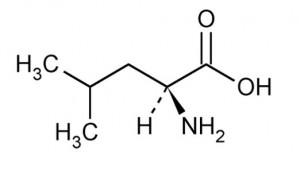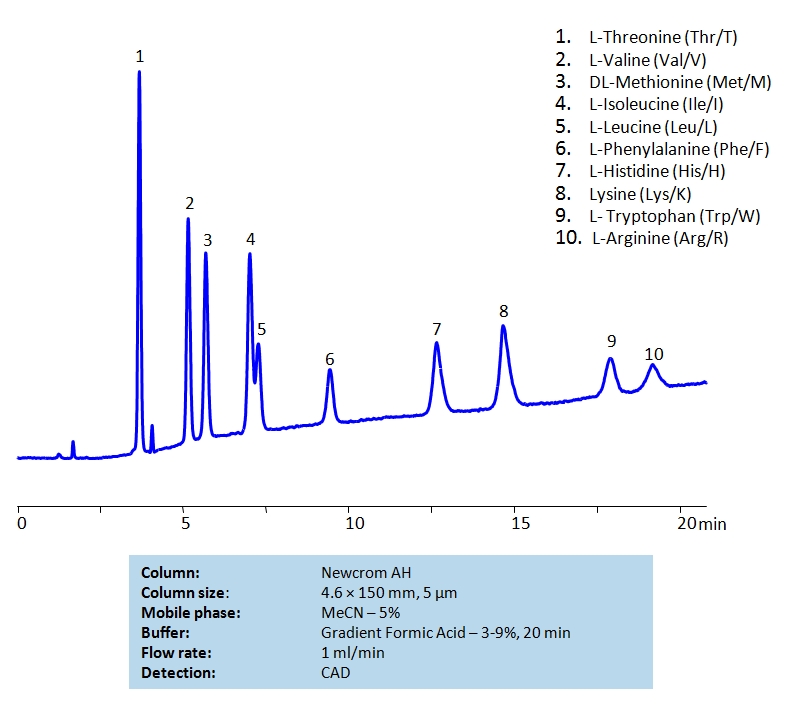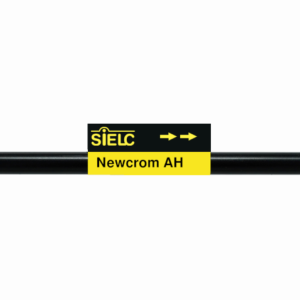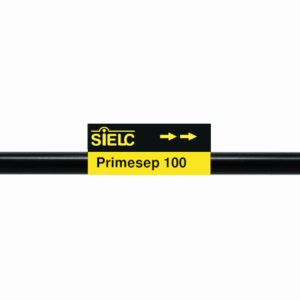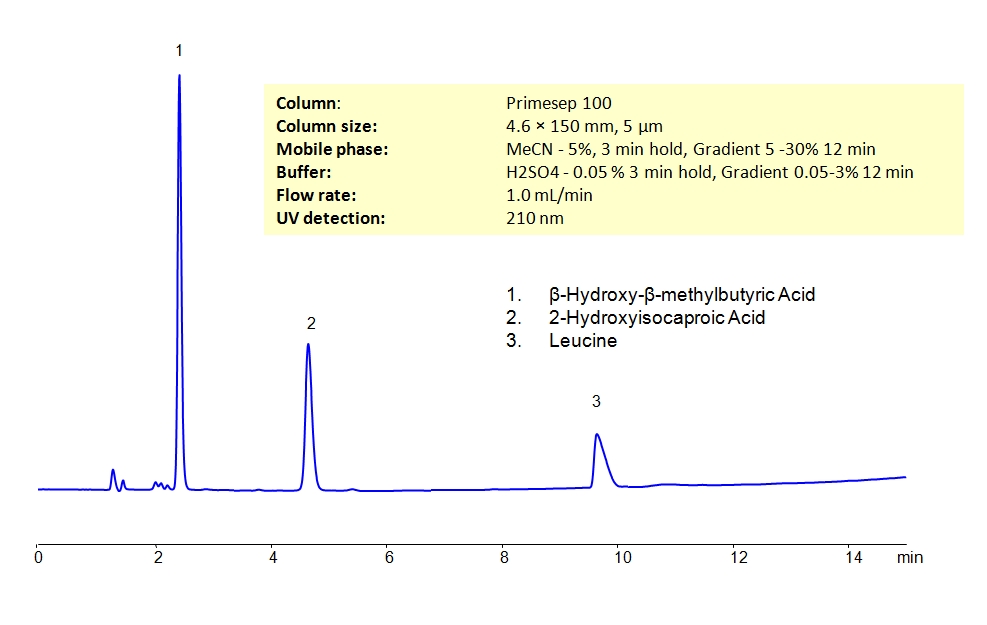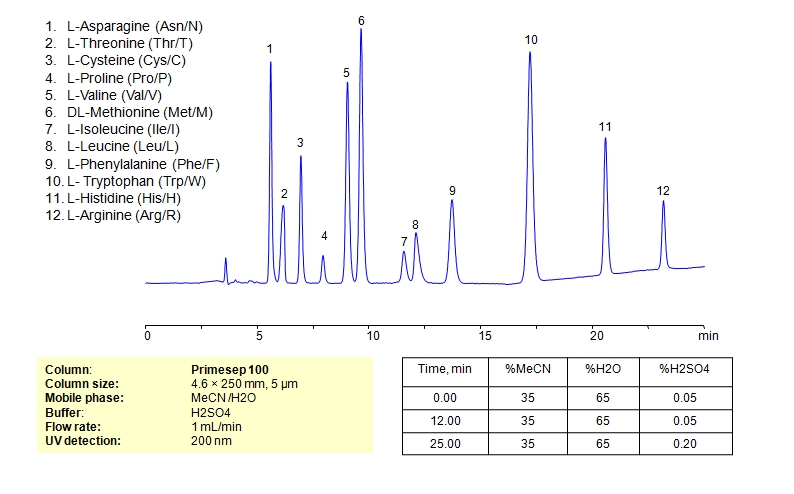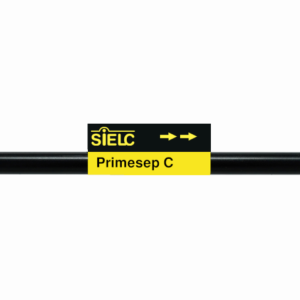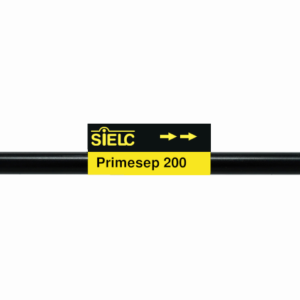| CAS Number | 61-90-5 |
|---|---|
| Molecular Formula | C6H13NO2 |
| Molecular Weight | 131.175 |
| InChI Key | ROHFNLRQFUQHCH-YFKPBYRVSA-N |
| LogP | -1.52 |
| Synonyms |
|
Applications:
HPLC Separation of Mixture of Nine Essential Amino acids and Arginine on Newcrom AH Column
September 25, 2020
Essential amino acids cannot be made by the body. As a result, they must come from food.
The 9 essential amino acids are: histidine, isoleucine, leucine, lysine, methionine, phenylalanine, threonine, tryptophan, and valine.
| Column | Newcrom AH, 4.6×150 mm, 5 µm, 100A |
| Mobile Phase | MeCN – 5% |
| Buffer | Gradient Formic Acid – 3-9%, 20 min |
| Flow Rate | 1.0 ml/min |
| Detection | CAD |
| Class of Compounds |
Drug, Acid, Hydrophilic, Ionizable, Vitamin, Supplements, Amino acid |
| Analyzing Compounds | L-Threonine (Thr/T), L-Valine (Val/V), DL-Methionine (Met/M), L-Isoleucine (Ile/I), L-Leucine (Leu/L), L-Phenylalanine (Phe/F), L-Histidine (His/H), Lysine (Lys/K) , L- Tryptophan (Trp/W), L-Arginine (Arg/R) |
Application Column
Newcrom AH
The Newcrom columns are a family of reverse-phase-based columns. Newcrom A, AH, B, and BH are all mixed-mode columns with either positive or negative ion-pairing groups attached to either short (25 Å) or long (100 Å) ligand chains. Newcrom R1 is a special reverse-phase column with low silanol activity.
Select optionsHistidine
Isoleucine
L-Threonine
Leucine
Lysine
Methionine
Phenylalanine
Tryptophan
Valine

HPLC Separation of Allo-Isoleucine, Isoleucine, Leucine on Primesep 100 Column
November 12, 2019
| Column | Primesep 100, 4.6×250 mm, 5 µm, 100A |
| Mobile Phase | MeCN/H2O – 5/95% |
| Buffer | AmFM pH 3.0 – 30 mM |
| Flow Rate | 1.0 ml/min |
| Detection | CAD (Corona) MS- compatible mobile phase |
| Class of Compounds |
Drug, Acid, Hydrophilic, Ionizable, Vitamin, Supplements, Amino acid |
| Analyzing Compounds | Allo-Isoleucine, Isoleucine, Leucine |
Application Column
Primesep 100
The Primesep family of mixed-mode columns offers a wide variety of stationary phases, boasting unprecedented selectivity in the separation of a broad array of chemical compounds across multiple applications. Corresponding Primesep guard columns, available with all stationary phases, do not require holders. SIELC provides a method development service available to all customers. Inquire about our specially-tailored custom LC-phases for specific separations.
Select optionsD-Leucine
DL-Isoleucine
Isoleucine
L-Alloisoleucine
L-Isoleucine
Leucine
allo-D-isoleucine

HPLC Separation of β‑Hydroxy-β-methylbutyric Acid, 2-Hydroxyisocaproic Acid and Leucine on Primesep 100 Column
September 13, 2019
Both β-hydroxy-β-methylbutyric acid (HMB) and 2-hydroxyisocaproic acid (HICA) are metabolites of the
essential dietary branched chain amino acid leucine.
| Column | Primesep 100, 4.6×150 mm, 5 µm, 100A |
| Mobile Phase | MeCN – 5%, 3 min hold, Gradient MeCN 5-30% 12 min |
| Buffer | H2SO4 – 0.05 % 3 min hold, GradientH2SO4 0.05-3% 12 min |
| Flow Rate | 1.0 ml/min |
| Detection | UV, 210 nm |
| Class of Compounds |
Acid, Hydrophilic, Ionizable, Normal human metabolite, Dietary supplement, Essential amino acid, Branched-chain amino acid (BCAA) |
| Analyzing Compounds | β‑Hydroxy-β-methylbutyric (HMB), 2-Hydroxyisocaproic Acid (HICA), Leucine |
Application Column
Primesep 100
The Primesep family of mixed-mode columns offers a wide variety of stationary phases, boasting unprecedented selectivity in the separation of a broad array of chemical compounds across multiple applications. Corresponding Primesep guard columns, available with all stationary phases, do not require holders. SIELC provides a method development service available to all customers. Inquire about our specially-tailored custom LC-phases for specific separations.
Select optionsD-Leucine
Leucine
β‑Hydroxy-β-methylbutyric Acid (HMB)

HPLC Separation of Mixture of 12 Amino Acids on Primesep 100 Column
March 11, 2019
| Column | Primesep 100, 4.6×250 mm, 5 µm, 100A |
| Mobile Phase | MeCN/H2O – 35/65% |
| Buffer | H2SO4 0.05% 12 min hold, gradient 0.05-0.20, 13 min |
| Flow Rate | 1.0 ml/min |
| Detection | UV, 200 nm |
| Class of Compounds |
Drug, Acid, Hydrophilic, Ionizable, Vitamin, Supplements, Amino acid |
| Analyzing Compounds | L-Asparagine (Asn/N), L-Threonine (Thr/T), L-Cysteine (Cys/C), L-Proline (Pro/P), L-Valine (Val/V), DL-Methionine (Met/M), L-Isoleucine (Ile/I), L-Leucine (Leu/L), L-Phenylalanine (Phe/F), L- Tryptophan (Trp/W), L-Histidine (His/H), L-Arginine (Arg/R) |
Application Column
Primesep 100
The Primesep family of mixed-mode columns offers a wide variety of stationary phases, boasting unprecedented selectivity in the separation of a broad array of chemical compounds across multiple applications. Corresponding Primesep guard columns, available with all stationary phases, do not require holders. SIELC provides a method development service available to all customers. Inquire about our specially-tailored custom LC-phases for specific separations.
Select optionsArginine
Asparagine
Cysteine
D-Isoleucine
D-Leucine
D-Valine
DL-Isoleucine
Histidine
Isoleucine
L-Cysteine
L-Methionine
L-Threonine
Leucine
Methionine
Phenylalanine
Proline
Tryptophan
Valine

HPLC Separation of Lysine and Arginine from Other Amino Acids
July 10, 2012
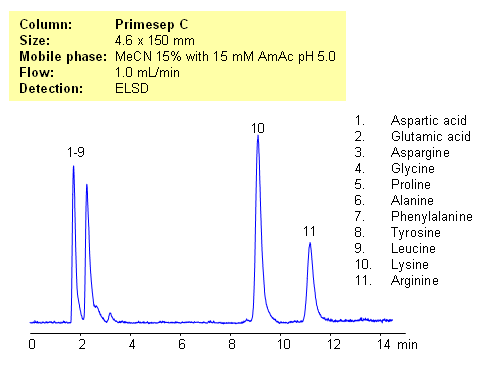
Application Notes: Amino acids are polar ionic compounds which are not retained on reversed-phase column without ion-pairing reagent. In our application, lysine and arginine can be separated from other amino acids. Amino acids with a pH between 3 and 5 and with one basic and one acidic group become very polar. Therefore these amino acids don’t have strong ion-exchange interaction with Primesep C stationary phase. Amino acids with two amino groups still carry positive net charge and can interact with stationary phase by cations-exchange mechanism. pH variation of the mobile phase can be an effective tool to adjust selectivity of separation for zwitter-ionic, basic and acidic compounds. This method can be used for separation of mono-charged compounds from compounds having an extra charge.
Application Columns: Primesep C
Application compounds: Aspartic acid, Glutamic acid, Aspargine, Glycine, Proline, Alanine, Phenylalanine, Tyrosine, Leucine, Lysine, Arginine
Detection technique: UV, LC/MS, ELSD/CAD
| Column | Primesep C, 4.6×150 mm, 5 µm, 100A |
| Mobile Phase | MeCN – 15% |
| Buffer | AmAc pH 5.0- 15 mM |
| Flow Rate | 1.0 ml/min |
| Detection | ELSD |
| Class of Compounds |
Drug, Acid, Hydrophilic, Ionizable, Vitamin, Supplements |
| Analyzing Compounds | Aspartic acid, Glutamic acid, Aspargine, Glycine, Proline, Alanine, Phenylalanine, Tyrosine, Leucine, Lysine, Arginine |
Application Column
Primesep C
The Primesep family of mixed-mode columns offers a wide variety of stationary phases, boasting unprecedented selectivity in the separation of a broad array of chemical compounds across multiple applications. Corresponding Primesep guard columns, available with all stationary phases, do not require holders. SIELC provides a method development service available to all customers. Inquire about our specially-tailored custom LC-phases for specific separations.
Select optionsArginine
Asparagine
Aspartic Acid
Glutamic Acid
Glycine
Leucine
Lysine
Phenylalanine
Proline
Tyrosine
UV Detection

HPLC Separation of Amino Acids in Zero Organic Mode on Primesep 200 column
July 8, 2011
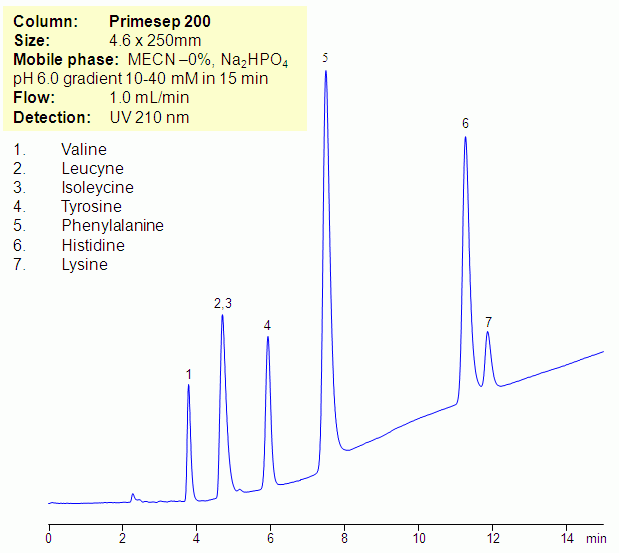
Essential and non-essential amino acids can be retained and separated in zero-organic mode on Primesep mixed-mode HPLC columns. Zero-organic mode is required to monitor isotopes of carbon. Amino acids are retained by combination of reversed-phase and cation-exchange mechanisms. At lower pH, some of the amino acids are more hydrophobic. Buffer pH will affect ionization state of amino acids, and at higher pH (above 2.5), the amino acids will be less hydrophobic and retentive in zero-organic mode. Amino acids can be monitored by low UV. Method can be used in archeological research for analysis of various molecules where presence of organic component of the mobile phase interferes with analysis.
| Column | Primesep 200, 4.6×250 mm, 5 µm, 100A |
| Mobile Phase | MeCN/H2O |
| Buffer | Na2HPO4 |
| Flow Rate | 1.0 ml/min |
| Detection | UV 210 nm |
| Class of Compounds |
Drug, Acid, Hydrophilic, Ionizable, Vitamin, Supplements |
| Analyzing Compounds | Valine, Leucyne, Isoleycine, Tyrosine, Phenylalanine, Histidine, Lysine |
Application Column
Primesep 200
The Primesep family of mixed-mode columns offers a wide variety of stationary phases, boasting unprecedented selectivity in the separation of a broad array of chemical compounds across multiple applications. Corresponding Primesep guard columns, available with all stationary phases, do not require holders. SIELC provides a method development service available to all customers. Inquire about our specially-tailored custom LC-phases for specific separations.
Select optionsIsoleucine
Leucine
Lysine
Phenylalanine
Tyrosine
Valine

HPLC Separation of Amino Acids in Supplements Capsules
April 10, 2005
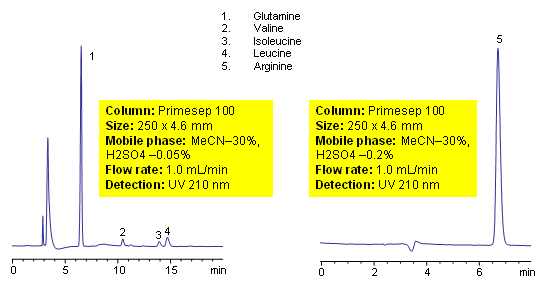
Glutamine, valine, isoleucine, and leucine are baseline resolved in a dietary supplement with a mobile phase of acetonitrile, water, and sulfuric acid with ultraviolet (UV) detection at 210 nm on a Primesep 100 column. Increasing the sulfuric acid concentration allows elution of arginine. Primesep 100 separates underivatized amino acids and amines by combining reversed-phase and ion-exchange mechanisms. The HPLC separation uses a mobile phase of water, acetonitrile (MeCN, ACN), and sulfuric acid with ultraviolet (UV) detection at 210 nm.
| Column | Primesep 100, 4.6×250 mm, 5 µm, 100A |
| Mobile Phase | MeCN/H2O – 30/70% |
| Buffer | H2SO4 |
| Flow Rate | 1.0 ml/min |
| Detection | UV, 210 nm |
| Class of Compounds |
Drug, Acid, Hydrophilic, Ionizable, Vitamin, Supplements, Amino acid |
| Analyzing Compounds | Arginine, Glutamine, L-Valine (Val/V), L-Isoleucine (Ile/I), L-Leucine (Leu/L) |
Application Column
Primesep 100
The Primesep family of mixed-mode columns offers a wide variety of stationary phases, boasting unprecedented selectivity in the separation of a broad array of chemical compounds across multiple applications. Corresponding Primesep guard columns, available with all stationary phases, do not require holders. SIELC provides a method development service available to all customers. Inquire about our specially-tailored custom LC-phases for specific separations.
Select optionsGlutamine
Isoleucine
Leucine
Valine

Bufferless Ion Separation (BLIS™) Chromatography of Amino Acids (2)
January 30, 2005
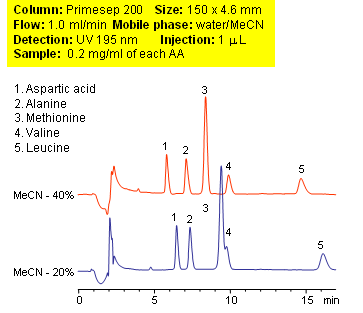
Adding on to the previous HPLC separation of amino acids using Bufferless Ion Separation (BLIS) Chromatography; here we have additional amino acids separated on Primesep 200 column using only water and acetonitrile (MeCN, ACN) in the mobile phase. Primesep 200 is a reverse-phase (RP) column with weak acidic ion-pairing groups embedded. With no buffer present in the mobile phase, detection can be achieved with UV, mass spectrometry (MS), evaporative light scattering detection (ELSD).
| Column | Primesep 200, 4.6×150 mm, 5 µm, 100A |
| Mobile Phase | MeCN |
| Buffer | No |
| Flow Rate | 1.0 ml/min |
| Detection | UV, 195 nm |
| Class of Compounds |
Drug, Acid, Hydrophilic, Ionizable, Vitamin, Supplements, Amino acid |
| Analyzing Compounds | Aspartic acid, Alanine, Valine, Methionine, Leucine |
Application Column
Primesep 200
The Primesep family of mixed-mode columns offers a wide variety of stationary phases, boasting unprecedented selectivity in the separation of a broad array of chemical compounds across multiple applications. Corresponding Primesep guard columns, available with all stationary phases, do not require holders. SIELC provides a method development service available to all customers. Inquire about our specially-tailored custom LC-phases for specific separations.
Select optionsAmino Acids
Aspartic Acid
Leucine
Methionine
Valine

